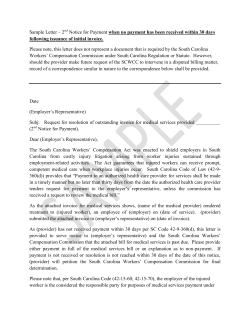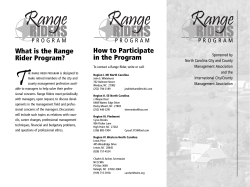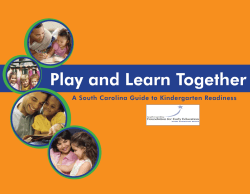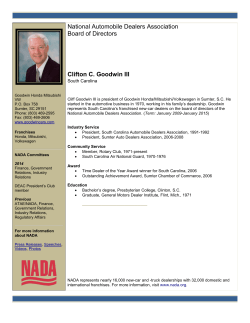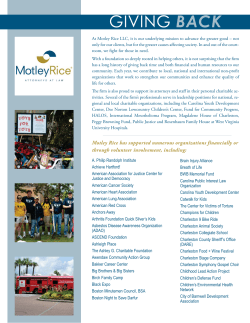
D What is Cyber Liability?
XXXVIII No. 3 l The North Carolina Social Worker Newsletter l August / September / October 2014 What is Cyber Liability? D Left to right: NASW-NC members Dana Courtney, Kay Castillo, Nicholle Karim, and Kathryn Falbo-Woodson at the North Carolina General Assembly. 2014 Legislative Short Session What Social Workers Need to Know By Kay Castillo, BSW Director of Advocacy, Policy and Legislation, Registered Lobbyist O n May 14th, legislators convened the 2014 Short Session. The primary goal of the short session is to adjust the budget to cover any unexpected shortfalls and to address legislation that met cross over in the 2013 long session. To be eligible for cross over, a bill must have passed the House or Senate. For example, House Bill 498, Autism Health Insurance Coverage, was eligible for passage during the short session as it passed the House in May of 2013 and was sent to the Senate though the Senate did not take it up during the long session. Because of this, we knew Autism Insurance, Medicaid Reform, Raise the Age, and budget discussions would be a priority for us in the short session. What has happened this session? In a series of twists and turns, legislators surprised us all this session. While the House and the Governor stood side by side on id you know that you can be sued if one of your clients is injured at your office, or if sensitive client data and records are lost? NASW does! NASW Assurance Services, Inc. (ASI) is pleased to announce the launch of its new General Liability and Cyber Liability Insurance Programs. NASW members can add either or both of these optional coverages to their existing NASW-Endorsed Professional Liability Insurance Policy. Why Do you Need General and Cyber Liability Protection? General Liability Protection is a critical option that protects your practice in case injury or property damage occurs to others as a result of your business operations. Your practice can be sued for almost anything: property damage, bodily/personal injury, advertising injury, or fire legal liability. Cyber Liability Protection is growing in popularity and necessity as technology continues to grow and so does the exposure now faced by businesses that operate online or store sensitive client data electronically on business computer systems. This coverage safeguards your practice when storing sensitive client data electronically or liabilities associated with doing business online. It helps protect your practice against the costs of security breaches. You are at risk of liability if any of these situations happen to you: sensitive client data that has been stored on lost/stolen laptops or backup devices, improper disposal of computer equipment, hacked computer, negligent release of data. Enroll today at www.naswassurance.org/pli or call your Member Care Unit at 855-385-2160. l Short Session continued on Page 6 In This Issue New Members.................................5 Ethics in Practice........................ ..... ..9 President’s Message........................ 2 Legislative Update.......................... 6 Continuing Education.................. .... 10 Executive Director’s Message..........3 Chapter Updates............................. 7 Profession Updates.................... ......11 Member Spotlight............................. 4 Around the State............................ . 8 Student Updates..............................12 412 Morson Street l P.O. Box 27582 l Raleigh, NC 27611-7582 l 919/828-9650 or 800/280-6207 l FAX 919/828-1341 l www.naswnc.org 2 August / September / October 2014 NASW-NC Board of Directors 2014 – 2015 President Sabrina Southern, MSW, LCSW Vice President Tanisha James, MSW, LCSW Secretary Jack Register, LCSW, LCAS Treasurer Georgianna Mack, MSW, LCSW Treasurer Elect Dori Wooten, BSW, MSW Student CNLI Chairperson Gloria Cook, MSW Undergraduate Student Representative Cathy Walsh, AA, AS Graduate Student Representative Monica Dhulia, BSW Coastal District Representatives Priscila Hilligus, MSW Student Logan Keziah, BSW, MSW Student Central District Representatives Megan Ingle, LCSW, LCAS, CSI Jessica Jurek, MSW, LCSWA Piedmont District Representatives Lydia Long, MSW, LCSWA, CSAC Mary E. Stephens, Ed.D, MSW, ACSW South Piedmont District Representatives Carmen Jiminez, LCSW, LISW-CP, LCASA Ashley Shope, LCSW, LCAS Western District Representatives Margaret Rose Hall, MA Ed, MSW, LCSWA, LCAS Amy Eades Fisher, LCSW, DSW Candidate South Central District Representatives Carolyn Craddock, LCSW, ACSW, LCASA Ryan Estes, LCSW, LCAS, CCS International District Representatives Jakob Bakst, PhD, MSW, MS 2nd Representative Vacant Delegates Jessica Holton, MSW, LCSW, LCAS Sonyia Richardson, MSW, LCSW Kelley Ryan, MSW, LCSW Elaine Wiercioch, LCSW XXXVIII No. 3 The North Carolina Social Worker Newsletter From the President Social Worker First By Sabrina Southern, MSW, LCSW E very year the National Association of Social Workers North Carolina Chapter (NASW–NC) holds its board retreat. The retreat is a standard way of introducing new members to the roles, responsibilities and expectations of being a board member. It is also a chance for the new and returning members to meet each other, socialize, network and begin to come together as a team. One way we facilitate the team building process is to ask each member to reflect on how, and why, they have chosen the profession of social work. This year, as I listened to my fellow board members share their personal journeys I was once again struck that such a disparate group would take such diverse journeys yet end in the same profession. Our current board is comprised of members from the frontline of practice and advocacy, academia, administration and the boardroom. The board represents individuals representing the full spectrum of a career: current students working to complete their degrees, newly graduated just stepping out into the field, mid-career professionals and retired for the second or third time. Regardless of their status or role, despite their specialties and differing perspectives, I heard intelligent, compassionate and intense voices. Voices that told journeys of strength in overcoming, of amazing focus, energy, drive, hope and compassion. I heard voices seeking social justice and equality and voices offering to mentor; reporting the duty to give back. I heard aspirations for raising the visibility of, and making a difference in, this diverse profession. I heard voices that, despite their current titles or their multiple professional roles, identify themselves as social workers first. When we identify as social workers we are telling others that we are guided in our practice by a set of core values: service, social justice, dignity and worth of person, importance of human relationships, integrity, and competence and the principles derived from them - our Code of Ethics. These core values help define our profession and set it apart. These core values help us as individuals, and as a profession, to make difficult decisions regarding the direction of our practice with individuals, in business and as a part of our communities. These core values and their derived principles are what hold us together as a profession. As our profession continues to grow, and the trend toward specialization continues, we face new challenges in defining our profession and in maintaining our hard won recognition, protections, and status as a profession. We need to embrace all of our social work colleagues, understanding the connection through our common core values and principles, no matter the specific setting or constituency being served. In this time of divisions and emphasis on the differences, I invite each of you to take time to reflect on your personal journeys to social work and I hope that you, like those at our retreat, come to identify as a social worker first. l “I heard voices that, despite their current titles or their multiple professional roles, identify themselves as social workers first.” - Sabrina Southern, NASW-NC President XXXVIII No. 3 The North Carolina Social Worker Newsletter 3 August / September / October 2014 From the Executive Director American Red Cross Collaboration By Kathy Boyd, ACSW, CMSW NASW-NC Chapter Staff Kathy Boyd, ACSW, CMSW Executive Director director@naswnc.org Valerie Arendt, MSW, MPP N ASW-NC has signed a collaborative agreement with the American Red Cross-North Carolina Disaster Mental Health Leadership. Social workers have long played a lead role in all levels and types of disasters throughout the United States and the world. Social workers make up the majority of the professionals volunteering in the disaster mental health area, but also volunteer in casework and first responder roles. The collaborative agreement recognizes the involvement of social workers and will foster a closer working relationship between the Red Cross in North Carolina and NASW-NC. The purpose of the agreement will be to provide information and training to social workers, increase the understanding of the unique needs in times of disaster, and clarify the many roles that social workers can play. The ultimate result will be to increase the number of social workers who are educated about disaster issues, and increase the number of social workers who become involved with the Red Cross at all levels, but primarily in the mental health arena.l Red Cross Disaster Mental Health What We Do and Why You Should Do It Too By Jane B. Finch, MSSW, LCSW; NASW-NC Member Red Cross DMH NC State Advisor and Triangle/Eastern NC Region Lead S imon was a 33-year-old developmentally disabled man who lived in New Orleans with his mother and her dozen or more dogs, for whose sake she refused to evacuate prior to Hurricane Katrina. After the storm passed and the waters were rising fast, the two of them raced to get the pets into their truck. Suddenly the single-wide home began to shift from its moorings; Simon was outside and tried to pull his mother out through the window, but just then the house broke free and he lost his grip on her arms. Simon, who couldn’t swim, grabbed hold of a door that floated by and was in the water for two days before finally being rescued by helicopter and brought to a Red Cross shelter. He never saw his mother, or the dogs, again. Mary was a single woman in her 40s, on disability and living alone in Durham, NC with one small dog. She was out grocery shopping one day when a fire swept through her apartment complex. Her apartment was destroyed and her dog, left in his crate, died of smoke inhalation. Lacking a yard or the money to bury him, Mary wept with gratitude when a Red Cross volunteer offered to bury his body on her rural property. Robin, a Red Cross volunteer from a Midwestern state, went on deployment to assist with the Oklahoma tornadoes. She admitted she wanted some time away from her troubles at home, which included caring for a grandson who was severely disabled by Shaken Baby Syndrome thanks to her daughter’s abusive former boyfriend. Robin struggled to fulfill expectations as a shelter worker, and when another tornado came through and caused another 20 fatalities, she completely decompensated. She expressed suicidal ideation, stopped eating & couldn’t sleep. She had to be monitored constantly until she was discharged from the response, and then accompanied by another volunteer on the plane back to her home state. Red Cross Disaster Mental Health continued on Page 8 Associate Executive Director membership@naswnc.org Kay Castillo, BSW Director of Advocacy, Policy & Legislation advocacy@naswnc.org Hope Venetta Director of Professional Development education@naswnc.org Kristen Carter Office Manager associate@naswnc.org Debbie Conner, MSW Bookkeeper Scott Luetgenau Membership Associate 919/828-9650 l 800/280-6207 www.naswnc.org Advertise in the Newsletter Reach over 4,500 Social Workers in North Carolina! The NASW-NC Newsletter is sent free of charge to NASW Members. Display Ad Rates Submitted in camera ready form: Full page $325 Half page $250 Quarter page $175 Classified Ad Rates Classifieds rates are $75 (up to 100 words). Acceptance for advertising does not imply endorsement by NASW. Opinions expressed in the NASWNC Newsletter should not be considered as being endorsed by NASW. 4 August / September / October 2014 XXXVIII No. 3 The North Carolina Social Worker Newsletter Member Spotlight NASW-NC Member Appointed to Licensure Board Amy Barsanti, MSW, CMSW A my Barsanti, MSW, CMSW has been appointed as a Professional Member (Public Sector) of the North Carolina Social Work Certification and Licensure Board by Governor Pat McCrory. She began her two year term on July 1, 2014. The North Carolina Social Work Certification and Licensure Board exists to protect the public by setting standards for qualification, training, and experience for those who seek to represent themselves to the public as social workers, certified social workers or licensed clinical social workers; and by promoting high standards of professional performance for those engaged in the practice of social work. The Board is composed of seven members including five certified or licensed social workers and two public members (non-social workers). Board members are appointed by the Governor to serve a two year term and may be re-appointed for one additional term. Ms. Barsanti earned her MSW in 1995 at Fordham University and her BSW in 1994 at Marist College. She currently serves as the Admissions Director for the Department of Social Work and lecturer at the University of North Carolina at Charlotte. She previously served as the Assistant Field Director and faculty liaison for the North Carolina Child Welfare Education Collaborative at UNC Charlotte. Ms. Barsanti has completed presentations on national, state and local levels, including presenting for NASW-NC. She was also an instructor at two community colleges. Prior to working in academia, her social work practice experience focused on advocacy, education and crisis intervention, serving victims of intimate partner violence, child abuse, sexual assault, and natural disasters. Ms. Barsanti’s previous board experience includes having served a three year term, ending in 2012, on the Mecklenburg Area Catholic Schools Board. Ms. Barsanti is a member of multiple professional organizations including the National Association of Social Workers, the Council on Social Work Education, and the Association of Baccalaureate Program Directors. l National Award Winner Barbara Lee, MSW, ACSW, LCSW T he United Network for Organ Sharing (UNOS) presented NASW-NC member Barbara Lee, MSW, ACSW, LCSW of Greenville, NC, the 2014 National Donor Memorial Award for Excellence in recognition of her work as a donation champion for more than two decades. The award was presented during UNOS’ June board meeting in the National Donor Memorial at UNOS’ headquarters in Richmond, VA. Ms. Lee is a 1980 BSW graduate of East Carolina University and a 1981 MSW graduate from the University of North Carolina at Chapel Hill. She is currently employed as a Clinical ESRD Social Worker/Living Donor Advocate at Vidant Medical Center in Greenville. “Barbara Lee is indefatigable. She’s served as a social worker at Vidant Medical Center Transplant Services for more than 20 years and as an active volunteer at Carolina Donor Services for more than 10. She’s wonderfully and enthusiastically creative, with the drive, energy and know-how to turn an idea into reality—as many of her colleagues and fellow volunteers can attest,” said OPTN/UNOS President Kenneth A. Andreoni, M.D. The effort that has perhaps had the most far-reaching impact was the result of being awarded a $100,000 grant in 2012 from the North Carolina “License to Give” Trust Fund Commission. After the award, Lee assembled a team of 12 donation advocates and created a nonprofit organization called the Eastern North Carolina Donor Impact Project (ENCDIP). ENCDIP’s purpose is to dispel myths and educate the African American and Latino communities about the need for minority donors, and since its creation has been highly visible at local festivals, health fairs and churches, schools and colleges. As Carolina Donor Services CEO Lloyd H. Jordan Jr., said, “Barbara exemplifies how one individual can make a huge difference.” UNOS established the National Donor Memorial Award for Excellence in 2010 to recognize exceptional advocates for organ and tissue donation. UNOS solicits nominations for the award from the 58 organ procurement organizations in the United States. Lee was nominated for the award by Carolina Donor Services. l XXXVIII No. 3 The North Carolina Social Worker Newsletter 5 August / September / October 2014 Membership Welcome New Members T he North Carolina Chapter of NASW would like to welcome the following new members who joined during the months of May, June & July! They have chosen to support their profession and advocate for social work values by joining NASW. We hope that, as new members, you will consider sharing your experiences and perspectives and take an active role with the Association by joining a committee, attending a Board meeting, or participating in a Local Program Unit. Coastal District (A) Emoni Battle Louis Craddock D’Aja Fulmore Krystal McCullen Chasity Mills Allison Mills Marlon Nolen Evan O’Connell Sarah Satterthwaite Suzanne Snyder Arely Vazquez Thomas Waite Stacy Zimmerman Central District (B) Jasmine Alston Gisselle Ashe Amna Baloch Sabrina Barnes Theresa Bayless Felix Blumhardt Connie Brunson Andrell Byers Quintisha China Jessica Clem Ashley Conner Shaniquah Cook Jeanne Cross Haley Dunlap Rebecca Edwards-Powell Anita Faircloth Marcie Fisher-Borne Megan Green Ashley Green Angela Gwaltney Jodi Hall Jean Hamilton Krista Heller Virginia Huffman Margaret Inman Jeremy Jones Tracy Judd Jessica Kasinoff Shauna Marek Deborah Mixon Juana Njoku Robin Palmer Sherri Pietropaolo Elizabeth Ramsey Tracy Rauschkolb Nelson Richardson Michelle Ropero-Cartier Melissa Saunders Tremaine Sawyer Marlon Smallwood Kwasi Smith Chrysecolla Taico Anthony Thorpe Cierra Wall Cathy Walsh Diana Westrick Amanda White Tracy Williams James Zimmer Piedmont District (C) Anna Baker Sandra Barrera Ashley Bennerson Anna Black Tu’Nicquia Bradley Jonniece Brown Meredith Casacchia Arbra Cates Katie Chrismon Holly Conner LaRhonda Copeland Katie Dockery Samantha Donathan Donna Dugger Deborah DuRoss Lisa Edmond Robin Fisher Susan Hardison Ashlyn Helms Sahirah Hobes Josie Holland Holly Long Cydney Mankins Nicolette Martinez Jeneya McLean Patricia Murphy Garland Nichols Kristina Parson Rita Phetmixay Demetria Powell-Harrison Monique Reynolds Elizabeth Russell Laura Silva Justiina Simmons Leah Smith Kenya Staley Blair Terry Frances Tisdale Melissa Tuttle Celeslie Valcourt Maxwell Waters Dana Williams Quanisha Wright South Piedmont District (D) Rasheedah Amisu Melissa Ammons Jason Anderson Alicsya Barringer Jessica Cartwright Lea Cheen Travis Clark James Freeman Antonia Guy Gail Hagen Henry Hardman Dejerica Heath Vicki Irving Kimberly Joseph Charity Knox Vanessa Leyton Joseph Newton Mon Nhim Nicole Oduh Sonja Payne Debora Reece Alyssa Shepherd Cynthia Shine Elizabeth Sides Maria Stine Brandi Stone Jessica Twaddle Kristen Venit Tia Wheeler Kathryn Wilkey Alyson Winter Mao Xiong Western District (E) Leslie Burrell Allison Burrow Lynn Caraveo Aundrea Collebrusco Kathryn Dirrig Lindsey Foster Monica Gonzalez Christopher Hart Jerry Higgs Barbara Hill Julia Hoffart Allison Houser Kayla Kephart Fred Marsh Noelle Nicholson Erin Phillips Hayley Prosser Margaret Smith Meghan Summey Terrance Taylor Rachel ThomsonLaToya Whitesides South Central District (F) Virginia Albertson Elisabeth Bass Kayla Bridgers Alison Broache Miriya Bryant Arianna Burkeen Amy Chapman Rebecca Chartier Patricia Combs Maya Davis Margaret Davis DeAndrea Davis Audrey Dickey Diana Drayton Janet Earle Erin Fitzpatrick Sarah Focken Rebecca Forrester Jonathon Gambrell Jaime Graf Erika Greene Jennifer Griffin Hope Griffith Rocha Holland Jennie Hubble Brittany Hunter Hope Ivory Vicki Jacobs Lauren James Nancy Johnson Martha Jones Karla Joyner Jeffery Kelly Vanessa Kopp Heather Lang Amy Lawson Jeffrey Lehman Brookelyn Letterman Najeana Little Taylor Luffman Julia Martin Aimee McClellan Nikisha McNeill Katherine Mims Gustavo Morales Jennifer Morrison Whitney Noftsier Cynthia Panalez Melissa Reed Lydia Reynolds Alejandra Robinson Anna Rodriguez Cassi Ronan Angelica Ross Jennifer Rotchford Juliet Seitz Brittany Shearin Ben Sofie Frances Taylor Kaitlin Tew Jasmine Thomas Richard Uranga Cristine Weatherspoon Emily Weeks Brian Weir Melissa Williams David Willis Carlet Wilson Joan Woodcock Find a Qualified Social Worker The NASW-NC Job Bank receives 9,000+ pageviews per month. Post your job opening today. www.naswnc.org 6 August / September / October 2014 XXXVIII No. 3 The North Carolina Social Worker Newsletter Legislative Update 2014 Legislative Short Session What Social Workers Need to Know By Kay Castillo, BSW Director of Advocacy, Policy and Legislation, Registered Lobbyist Short Session continued from Page 1 many issues, the Senate was often the topic of conversation. In fact, as of this newsletter publication date legislators are still in session! Some of the bills mentioned below may change as session continues. Medicaid Reform: House Bill 1181 Medicaid Modernization. The Senate came up with an entirely new Medicaid plan. Under the new plan, the Division of Medical Assistance (DMA) would become an independent agency called the Department of Medical Benefits which would manage behavioral, physical and other specialized care for Medicaid and NC Health Choice recipients under a Managed Care Organization (MCO) or Accountable Care Organization (ACO) model. The Senate scheduled this new Department to be created by September 1, 2014 and will be governed by a 7-member Board of Directors. The Senate plan also directs the Department of Health and Human Services to immediately cease any activities related to Medicaid reform. While the Senate has passed this plan as of July 28, 2014, the House has not made it clear if they will pass this plan. Budget: Nearing eight editions to a ‘mini’ budget at this point, legislators have been firm on their desire to give teachers a significant pay raise. In order to do this, the Senate originally proposed making massive cuts to the Aged, Blind, and Disabled on Medicaid in order to give an 11% pay raise NASW Credentials Received! Congratulations to the following NASW members who received National professional credentials through NASW May - July 2014! but the House would not allow it. This sparked weeks of open and closed door meetings with a 42 member appointed conferee committee. While a new budget did not need to be created, the state budget had about a $450 million revenue shortfall due to steep tax cuts in the long session and an unknown Medicaid budget shortfall that legislators fought over. A budget has to be balanced in North Carolina which made a need for negotiations. Erin’s Law: House Bill 369 Criminal Law Changes: As a surprise bill, Senators introduced a bill called Erin’s Law that would establish a committee to identify age appropriate sexual abuse education to be taught to students and educators in the school system. The original bill did not have any behavioral health influence so NASW-NC worked with bill sponsors to change this. As session progressed, and the bill was going nowhere, language was changed and added to House Bill 369 to have the Human Trafficking Commission study sexual abuse and come up with the curriculum to be taught. NASW-NC was effectively added to the bill to work with the Commission, the NC Pediatric Society, Prevent Child Abuse, and the NC Coalition Against Sexual Assault on this matter. Autism Insurance: Senate Bill 493 Health and Safety Regulatory Reform Act: The language from House Bill 498, supported by NASW-NC, passed the House in the 2013 long session made a reappearance in Senate Bill 493. Outside of the original bill that allows for reimbursement of LCSWs for therapeutic care, the new language establishes a board for Behavioral Analysts in North Carolina (there is currently no state level licensing board for behavioral analysts). The bill also prohibits tanning bed use for minors under the age of 18. The bill passed the House but has not been taken up by the Senate. Military Service Members, Veterans, & Their Families - Social Worker Raise the Age: House Bill 725 Young Offender’s Rehabilitation Act: The bill that would have raised the age for sixteen and seventeen year olds to be treated as juveniles for minor crimes instead of adults, saw little action this session. While the House pressed forward and passed it overwhelmingly with a final vote in the early weeks of session, the Senate never took up the bill. Bobette N. Donaldson, LCSWA, C-ASWCM, C-SWHC What is next? Nancy V. Broadwell, C-SWCM Certified Social Work Case Manager Certification Paul Douglas Campbell, LCSW, MVF-CSW Certified Advanced Social Work Case Manager Certified Social Worker in Health Care Nancy Birch Hauch, LCSW, MVF-CSW Military Service Members, Veterans, & Their Families - Social Worker Cobi Weikel Ingram, ACSW Academy of Certified Social Workers (ACSW) Certification Lucas Vrbsky, LCSW, ACSW, MVF-CSW Military Service Members, Veterans, & Their Families - Social Worker Learn more about NASW Credentials and how they can benefit your social work career at socialworkers.org. When session adjourns, NASW-NC will focus on endorsing candidates for the 2014 General Elections in November. NASW-NC’s Political Action for Candidate Endorsement Committee (NC PACE) endorses candidates who strongly support the social work profession and issues important to our clients. By working to get the right candidates elected into office, our work in the long session is supported by legislators that know and support our profession. Post election, NASW-NC will be working with legislators on priority issues for the 2015 Long Legislative Session that begins in January. l XXXVIII No. 3 The North Carolina Social Worker Newsletter 7 August / September / October 2014 NASW-NC Chapter Updates Welcome to the 2014-2015 Board! T he 2014-2015 NASW-NC Board of Directors has been elected and is ready to represent you! What does the Board do? The Board makes decisions to advance the profession in North Carolina. Students and clinicians comprise the Board to help the association advance the profession of social work. Learn more about the Board members and how to contact them and invite them to your organization or event to speak about the future of the social work profession in North Carolina. www.naswnc.org NASW-NC Board of Directors Meet for Annual Retreat By Kathy Boyd, ACSW, CMSW; Executive Director T he NASW-NC Board of Directors met at Browns Summit Center on July 25th and 26th for their annual retreat and first official Board meeting of the 2014-2015 fiscal year. Those Board members who were new on the Board received an orientation to NASW which included a fiscal training and orientation to Board roles and responsibilities. During both the retreat time and the official board meeting, Board members discussed the association plans for member recruitment and retention, burnout among social work professionals, mentoring and supervision of those in the profession, our connection with students and the schools of social work in NC, and our legislative agenda for North Carolina’s upcoming long legislative session. During the Board meeting the follow actions were taken: “I move to approve the May 31st, 2014 minutes, with corrections, and correct name Stevens to Stephens.” Motion made by Georgianna Mack with a second by Mary Stephens. Motion carried. Fisher. Motion carried. “I move to implement a new Committee, Public Outreach Committee to bridge the gap with members and the profession.” Motion made by Lydia Long with a second by Ashley Shope. Motion carried. “I move those attending the clinical supervision training must attend all 20 hours of training in order to earn and be eligible for the Certificate in Clinical Supervision. Those attending for CE credit only will be awarded CE based on the actual number of hours attended.” Motion made by Margaret Rose Hall with a second by Amy Fisher. Motion carried. All remaining Board meetings for the 2014-2015 year will be held at the Chapter office in Raleigh: September 27, December 6, January 24, March 28 and May 30. All Board meetings are open to the public and those wishing to attend as a guest should contact Chapter Director Kathy Boyd at director@naswnc.org. l “I move to pass the January 14 Board minutes as presented.” Motion made by Ryan Estes with a second by Ashley Shope. Motion carried. “I move to approve the budget for 7/1/2014 – 6/30/2015and the balance sheet of June 30, 2014.” Motion made by Mary Stephens with a second by Dori Wooten. Motion carried. “I move to request a recommendation from the finance committee on the possibility of combining the money market and reserves account.” Motion made by Priscila Hilligus with a second by Lydia Long. Motion carried. “I move to approve the fiscal year 2014-2015 budget which includes $9,500 increase in staff salaries.” Motion made by Dori Wooten with a second by Amy NASW-NC Board members Jack Register and Lydia Long having a great time at the NASW-NC Board Retreat 8 August / September / October 2014 XXXVIII No. 3 The North Carolina Social Worker Newsletter Around the State Red Cross Disaster Mental Health What We Do and Why You Should Do It Too By Jane B. Finch, MSSW, LCSW; NASW-NC Member Red Cross DMH NC State Advisor and Triangle/Eastern NC Region Lead Red Cross Disaster Mental Health continued from Page 3 These are just a few of the individuals I have met and helped in my years as a Red Cross Disaster Mental Health (DMH) volunteer. I first learned about the role from a colleague in 1997 when I expressed a desire to assist in the aftermath of Hurricane Floyd, when stories of unearthed coffins floating down the streets of inundated townships in eastern North Carolina grieved me terribly. Back then the DMH training was a two-day course and hard to find, so it wasn’t until 2003 that I finally completed it. Because I maintain an active psychotherapy practice, I have mainly focused on local responses to fires and floods and on volunteer training, recruitment and team-building; but when big events happen I try to carve out the time to deploy for two weeks, such as for Katrina in 2005 and Oklahoma in 2013. There are many ways in which we as social workers are perfect fits for the DMH role. Our Code of Ethics asks us to give of our skills in this way: Section 6.03, Public Emergencies, says “Social workers should provide appropriate professional services in public emergencies to the greatest extent possible.” Those who are most vulnerable and in need of assistance following a disaster are often those who are economically disadvantaged and have fewer social supports… exactly the population we are most dedicated to serving. Social workers typically are flexible and willing to meet clients wherever they are, not made uncomfortable by the lack of a structured office setting and schedule. So it is no surprise that social workers comprise 35-40% of our DMH workforce, which includes licensed MH professionals from all other mental health disciplines as well as school counselors and psychiatric nurses. The DMH role was created in 1992, mainly to provide stress mitigation and support to Red Cross staff, both paid employees and volunteers. Staff mental health continues to be a primary focus of our work. Red Cross personnel are well-trained and effective in meeting most of the needs of individuals affected by disasters. However, the work often involves long hours and harsh conditions, and secondary traumatization can occur. DMH helps by promoting self-care, offering individual debriefings, mitigating conflicts, providing emotional support to those facing disciplinary issues, and contributing to better functioning on the organizational level. We also provide direct assistance to survivors who have experienced more direct exposure to the event, suffered injury or casualties (including pets such as in the examples above), or are observed to demonstrate greater emotional instability. The main services we provide to such individuals are crisis intervention, psychoeducation, connection to resources, problem-solving and advocacy. This work is not without risks. When that sec- ond tornado skirted Oklahoma City – El Reno, the secondlargest tornado in recorded history, with 296 mph winds, that killed the storm chasers and came within 5 miles of the hotel I was staying in with 100 other volunteers – I was huddled in a bathroom with two nurses, a mattress over our heads, fielding frantic texts and calls from my loved ones. The organization does everything it can to keep staff and clients safe, but as we know, there are no guarantees. Potential volunteers should weigh their responsibilities and obtain the consent of anyone who depends on them, including clients. I inform all my clients about my volunteer status and the possibility for sudden deployments, and when taking on new clients I try to avoid the more fragile or I ensure that they have another therapist or psychiatrist who could share responsibility for their care. And I’m lucky to have a husband who supports my vocation and grown children and friends who look out for him when I’m away. While we often say we hope our services won’t be needed, clearly the number and scope of natural disasters are increasing, as well as the human-caused ones like the Newtown school shooting. It feels good to be able to help reestablish a sense of comfort and safety in the face of such suffering, and it is always so moving to see “the better angels of our nature” at work within a traumatized community. I’m excited about the collaboration agreement we have signed with NASW-NC, described in Kathy Boyd’s column, to better promote the DMH role and make training and mentoring opportunities more available. I hope you’ll consider joining our ranks, as I know it could be one of the most rewarding experiences of your social work career. To get involved contact Jane Finch at jane.finch@redcross. org. l XXXVIII No. 3 The North Carolina Social Worker Newsletter 9 August / September / October 2014 Ethics in Practice Shepherd Our Students By Ravita T. Omabu Okafor, MSW, LCSW; NASW-NC Ethics Committee Chair T he NASW-NC Chapter Ethics Committee (CEC) has developed an initiative centered on our profession’s most vulnerable population students. As aspiring social work professionals, students depend on professors, field instructors, and other professionals to guide them along the way. As a good shepherd carefully and conscientiously attends to sheep, the social work profession has a responsibility to shepherd our students. •• If your question has a legal component, you may contact NASW’s national office attorneys at 800-742-4089. •• Since most complainants file ethical complaints with the North Carolina Social Work Certification and Licensure Board, consider reviewing the Social Work Practice Act and the Administrative Code found at www.ncswboard.org to ensure your compliance. •• To view the NASW Code of Ethics (2008) online, visit www. socialworkers.org/pubs/code/code.asp. Email your consultation question to naswncethics@gmail.com or leave a detailed, confidential voice mail message by calling 919-828-9650, ext. 300 (for callers in the Raleigh area) or 800-280-6207 ext. 300. Your NASW Membership will be verified. l As we all have served as shepherds and received guidance as sheep at various points in our careers, we appreciate competent, effective, and stimulating teaching, internship experiences, and workplace practice. While offering ethical consultation to the membership and working in various settings, your CEC is aware that students appreciate responsible shepherds when they have them and suffer significantly when their assigned shepherds fail them. Please consider your knowledge of students’ positive and negative experiences regarding ethics education, modeled ethical decision-making, internships, mentoring post graduation and share your observations, concerns, and suggestions. We would like to hear from shepherds (e.g., faculty, field instructors, field liaisons, professionals in the field) and sheep (students). Please send your confidential comments to naswncethics@gmail.com or leave a voice mail message at 919-828-9650, extension 300. We will use your input to develop effective ways to respond to students’ needs. If you would like to have a member of our committee visit your classroom or organization to facilitate a conversation about “Shepherd Our Students,” please call or email your interest. Based on the volume of requests we receive, we will determine the most helpful way to respond. Thank you in advance for your time and consideration! Help “Shepherd Our Students!” Please remember that your NASW-NC Chapter Ethics Committee offers peer ethical consultation to NASW-NC members. To submit your ethics questions, please email naswncethics@gmail.com. PLEASE NOTE: Your NASW-NC Chapter Ethics Committee continues to offer Peer Ethical Consultation FREE to NASW-NC members. NASW-NC offers consultation to assist its members in considering options for ethical decision-making. Should you access this service, please understand that you are fully responsible for your actions regarding your ethics question brought before NASW-NC staff and/or members of the NASW-NC Ethics Committee. We are not responsible for any consequences that occur as a result of your actions. Additional resources for Ethics Consultation: •• NASW’s national Ethical Consultation Hotline (1-800-742-4089, Tuesdays 10 a.m. to 1 p.m. and Thursdays 1 p.m. to 4 p.m). •• You may also contact your malpractice insurance carrier for ethical and legal consultation. If NASW Assurance Services is your carrier, you may contact the Risk Management Helpline at 855-385-2160. September 29, 2014 Brookstown Inn Winston-Salem, NC Register today www.naswnc.org 10 August / September / October 2014 XXXVIII No. 3 The North Carolina Social Worker Newsletter Continuing Education Top 4 Reasons to Register Early for NASW-NC Conferences and Workshops By Hope Venetta NASW-NC Director of Professional Development W hy should you register early for continuing education opportunities with NASW North Carolina? 1. You are assured a seat in your first choice of breakout sessions!! 2. There will be enough time for payment processing so you can request a check from your agency in plenty of time to secure a spot. 3. No late fees. 4. No sitting on pins and needles wondering if the wait list will open up. Registration will always be available to NASW-NC members first and open to the general public at a later date! Please keep in mind that breakout sessions reach capacity in almost all of our conferences, and some conferences have filled up entirely. We try to make last minute adjustments to accommodate, but this is not always possible. Register early to partake in the quality, cost effective CE opportunities that provide vital and timely topics from expert presenters. 2014-2015 NASW-NC CE offerings: September 29, 2014: Essentials Series: Teletherapy Brookstown Inn, Winston-Salem, NC 6.5 Hours of CE | $109 members/$149 non members This presentation will make the social work community aware of the new opportunities electronic-based therapy can offer. Guidelines and regulations, including state laws and Social Work ethics will be discussed. Also learn what modalities are billable to insurance companies, Medicaid and Medicare. Come prepared to learn about this option to diversify your clinical practice. October 11, 2014: LCSW Exam Prep Session McKimmon Center, Raleigh, NC 5 Hours of CE | $88 members/$119 non members Our Fall LCSW Examination Preparation course. The course includes a pre-test, study guide, and a day of intensive learning and review, plus time for questions and answers. November 21-22, 2014: Annual Fall Conference Renaissance Hotel, Asheville, NC 13 Hours of CE, up to 4 Ethics $150 member, $95 student/retired/unemployed members (reduced fees for members only)/$210 nonmembers The Fall Conference is a meeting for the entire profession. Everyone from the social work student to the LCSW in private practice can benefit from the keynotes and breakout sessions. Fall Conference is designed to focus on professional development, social worker physical and mental self-care, alternative practices and therapies, as well as issues related to the practice of social work in general. March 6, 2015: Annual Ethics Conference & Awards Banquet McKimmon Center, Raleigh, NC 6 Ethics CE Hours | $95 members/$129 non members This conference kicks off our celebration of Social Work Month while awarding excellence in our field and providing Ethics Continuing Education. April 18, 2015: LCSW Exam Prep Session McKimmon Center, Raleigh, NC 5 Hours of CE | $88 members/$119 non members Our Spring LCSW Examination Preparation course. The course includes a pre-test, study guide, and a day of intensive learning & review, and time for questions and answers. May 4-6, 2015: Clinical Social Work Institute Holiday Inn, Wrightsville Beach, NC 20 Hours of CE, up to 4 Ethics | $205 members/$260 non members Clinical Institute will be held at the beach just a short car ride from Historic Downtown Wilmington on the Cape Fear River. This conference will include keynotes and breakout sessions for both advanced and beginning clinical social workers and will include opportunities for Ethics Continuing Education, networking and enjoying the beach location. June 18-20, 2015: Annual Clinical Supervision Certificate Training RTP Marriott Hotel, Durham, NC 20 CE Hours, up to 4 Ethics | $205 members/$260 non members, $45 for exam to earn certificate Earn your NASW-NC Clinical Supervision Certificate, gain 20 hours of CE, and network with other Clinical Supervisors. Topics include supervisory styles and techniques, skills to supervise clinical social workers at various stages of clinical development, managing challenging supervisees and situations, evaluating clinician competency, cultural competency, ethics, legal and regulatory issues. l XXXVIII No. 3 The North Carolina Social Worker Newsletter 11 August / September / October 2014 Profession Updates Recovery from Addiction in the Collegiate Sphere By Scott Leutgenau, BSW Student NASW-NC Membership Associate T HERE IS A PROBLEM: The college experience provides a unique set of challenges for individuals abstaining from alcohol and other drugs. A recent report from the Substance Abuse and Mental Health Services Administration (SAMHSA) cites 22% of full-time college students as illicit drug users, 39.1% as binge drinkers, and 13.6% as meeting the criteria for heavy drinkers. Recovery from use is routinely challenged on college campuses through factors such as the expectation of use as a normal part of the college experience, the stigmas and misunderstandings regarding the disease of addiction, the heightened availability of alcohol and other drugs, as well as the stressors associated with the more serious academic demands of college (Grahovac, et al., 2014). The essential component lacking is a supportive, resource-rich environment that creates a safe space for students to pursue their educational goals while successfully maintaining their recovery from use. Historically, measures have been taken on campuses throughout the country to prevent overuse, yet a sensible solution for students who have already made the decision to abstain from alcohol and other drugs has, until recently, been missing. A SOLUTION EXISTS: A widespread movement across college campuses has begun to focus on human capital in lieu of financial capital. This change has taken shape as communities and programs designed to offer students living in recovery from addiction disorders the opportunity to thrive in the recovery-hostile environment of college life. Ninety-five of these organizations have emerged to offer a wide variety of resources to this diverse population spanning every socioeconomic status. Many students miss the opportunity to succeed without the support that these communities offer as they face the social and emotional risks inherent in collegiate culture. I recently received a scholarship from the Governor’s Institute on Substance Abuse to attend the Southeastern Collegiate Recovery Conference in Athens, Georgia. At this conference I learned more about the programs and resources offered nationwide by these campus-based organizations: mutual-aid meetings, specialized advisors and academic support, mentorship programs, scholarships, retreats and service projects. The strength and value of these organizations became apparent as I listened to remarkable stories from those benefitting from them. A gentleman who is currently the director of a Collegiate Recovery Program at one of the nation’s largest universities told his moving account of writing to Texas Tech University from a jail cell. He was serving a drug-related sentence and had discovered Texas Tech’s standing as a trailblazer in the Collegiate Recovery Community movement. After receiving his doctorate in social work, he now passes on the experience of hope to the next generation of students living with addictive disorders. This sort of second-chance opportunity is just one of the immensely impactful measures that Collegiate Recovery Communities and Programs have offered individuals in recovery. CHANGING PERCEPTIONS: The damaging stigmas that have surrounded addiction are being challenged at unprecedented levels. NASW-NC’s past president, Jessica Holton, spoke out against the perception that those battling addictions make a deliberate choice at a recent roundtable discussion on addiction. Addiction is a chronic disease that deserves the same level of empathy and care that patients with diabetes or any other physical ailment receive over the long-term. Former Deputy Director of the Office of National Drug Control Policy, A. Thomas McLellan, expands on Jessica’s point: “Having an addiction is not a moral choice. In fact, I think it is accurate to say that having an addiction is not a choice at all.” Collegiate Recovery Communities and Programs afford the chance to showcase the successes of those in long-term recovery. Bringing to light these achievements delivers a positive, and potent, message to combat the consistent portrayal of individuals with addictive disorders in the media as hopeless. Everyone knows someone that has experienced successful long-term recovery from alcohol and other drugs, yet the anonymity that most maintain because of these negative stereotypes keeps the victories hidden. At the recent National Council on Behavioral Health Conference in Washington, D.C., a range of professionals spoke about the disparity in treatment delivered by physical healthcare providers and the services given to individuals with addiction disorders. Applying a short-term treatment model to a long-term, chronic disease has delivered troubling results. The lack of training that doctors, nurses, and pharmacists receive further perpetuates misconceptions about the nature of addiction and best ways to approach treatment. The implementation of Collegiate Recovery Programs and Communities at every institution of higher learning is another step in adhering to a continuum of care model that provides the extended support necessary to individuals living with addictive disorders for the longterm. LOCAL ACTIVITY: Governor McCrory recently awarded $125,000 to six different campuses in North Carolina to form Collegiate Recovery Communities and to galvanize prevention efforts. This is not the only indication that Collegiate Recovery Communities are steadily picking up steam in North Carolina. Universities like UNC-Charlotte have become part of the national conversation through prominently integrating their program into their Center for Wellness Promotion. Countering the grim tales of addiction with stories of recovery successes through the creation of these therapeutic communities is a remarkable step toward creating social justice for those battling addiction. Real change will continue as social workers, healthcare professionals, politicians, and law enforcement become more knowledgeable about the true nature of addiction and the potential for individuals to live renewed, productive, and gratifying lives. l “Words are important. If you want to care for something, you call it a ‘flower’; if you want to kill something, you call it a ‘weed’.” - Don Coyhis 12 August / September / October 2014 XXXVIII No. 3 The North Carolina Social Worker Newsletter Student Updates NASW-NC MSW Student Member Receives National Award Chelsea Kolander, MPH By Valerie Arendt, MSW, MPP; Edited from Award Essay T he NASW Foundation’s Consuelo W. Gosnell Memorial Scholarship is awarded to master degree candidates in social work who have demonstrated a commitment to working with, or who have a special affinity with American Indian/Alaska Native and Hispanic/Latino populations, or in public and voluntary nonprofit agency settings. University of North Carolina Chapel Hill (UNC-CH) MSW Student, and NASW-NC Member, Chelsea Kolander, MPH is the winner of one of the $2,000 scholarships. A native of San Jose, CA, Chelsea is of Choctaw descent and spent her college years connecting with other American Indians through student organizations for personal support. After graduating from the University of California at San Diego, Chelsea worked on the Rincon Indian Reservation in Valley Center, California on two research studies at the Indian Health Council. The first was the Healthy Heart, Healthy Gums Study, which sought to address health disparities in dental and cardiac health by increasing access to regular, high quality dental care and monitoring cardiac outcomes. The second was the Healthy Women: Healthy Native Nation Study, which aimed to reduce disparities in Fetal Alcohol Spectrum Disorders through an innovative computer-based health education intervention for women. The next step in her journey led Chelsea to move to North Carolina to begin the Master of Public Health at the Gillings School of Global Public Health at UNC Chapel Hill. For her research practicum, Chelsea worked with professors at the School of Public Health to provide technical assistance to Indian tribes who were involved in two projects: The Centers for Disease Control and Prevention Tribal Motor Vehicle Injury Prevention Program, and the Indian Health Service Children & Youth Project. After graduation, Chelsea joined the Carolina Native Alumni Club, and has been an active member, attending workshops and gatherings to address the disparities in American Indian access and success at UNC-CH. Chelsea completed an internship at the UNC American Indian Center where she assisted with grant-writing, planning workshops, and visiting several communities in the Healthy Native North Carolinians Network. Chelsea is now pursuing her MSW at UNC-CH and is interested in research and practice with American Indians, including LGBTQ-identified people, in the areas of mental health, violence prevention, trauma recovery, and fostering social support. Chelsea is “keen to build on the strengths inherent within Native communities both in North Carolina and around the country through community engaged research and practice.” Chelsea plans to pursue a doctorate in social work to learn how to address historical and modern trauma with the goal of eliminating health disparities. Chelsea says, “Throughout my adult life I have been committed to serving Native students and communities, and I will continue to advocate, support, and collaborate with American Indian people in the future.” l LCSW Exam Preparatory Session Outside of class, Chelsea served as the American Indian Recruitment and Success Graduate Assistant where she worked to plan the annual recruitment event. GREAT PSYCHOTHERAPY OFFICE SPACE AVAILABLE Office space located in Raleigh near Rex Hospital immediately off I-40 and Blue Ridge Rd. This space is part of a suite of 3 offices located on ground floor with a furnished waiting room. Secure space includes large windows, private entrance, bathroom, and utilities. Office is convenient to Cary, Durham, downtown Raleigh, and RTP. $630.00/month INTERESTED? Email clsauber@yahoo.com October 11, 2014 McKimmon Center Raleigh, NC www.naswnc.org XXXVIII No. 3 The North Carolina Social Worker Newsletter 13 August / September / October 2014 Talk is Not Enough Learn to Activate Deeper & Broader Levels of Healing with Your Clients • Use more holistic methods • Learn specific tools to positively influence the body-mind interaction • Earn 12 CE hours for social workers By working with the whole body-mind-energy system, energy psychology facilitates rapid positive change and optimal psychotherapeutic outcomes, and is aligned with the latest findings from neuroscience and traumatology. You’ll learn the borad framework, and the tools to use it effectively. Essential Skills in Comprehensive Energy Psychology Level 1: September 20-21, 2014 Level 2: November 15-16, 2014 Richmond, VA For more details or to register, visit www.energypsych.org or call 619-861-2237 Register by August 11 for Early Bird Pricing. Join ACEP and save even more! Training workshops designed for mental health professionals. ACEP Audio Library and Online Learning Center Plus, register for this workshop and save 40% on your annual subscription. Enjoy talks by luminaries in the field – Bruce Lipton, Dan Siegel, Bessel van der Kolk, Gary Craig, Donna Eden, Larry Dossey and 400 others. Less than 20 cents per lecture – on any device from any location. Register now at www.energypsych.org 14 August / September / October 2014 XXXVIII No. 3 The North Carolina Social Worker Newsletter The University of North Carolina at Chapel Hill School of Social Work The UNC-Chapel Hill School of Social Work is one of the nation’s leaders in social work research and education, and is consistently ranked among the top 10 schools of social work in the country. We offer three MSW Program options and a Doctoral program: • Advanced Standing MSW Program Enables students with an accredited BSW degree to earn an MSW degree in just 12 months. Program begins each May. • Full Time and Distance Education MSW Programs Complete your MSW in Chapel Hill with our two-year or three-year program. We also have a distance education site in Winston-Salem which offers a three-year program. • PhD Program Prepares students to become leaders in research on innovative social intervention, scholarship and social work education. For information session dates, please visit: http://ssw.unc.edu/admissions (919) 962-6442 • Email: mswadmissions@unc.edu 325 Pittsboro St. • Campus Box #3550 Chapel Hill, NC 27599-3550 http://ssw.unc.edu XXXVIII No. 3 15 August / September / October 2014 The North Carolina Social Worker Newsletter COLLEGE OF HUMAN ECOLOGY School of Social Work at East Carolina University A leader in social work education and research, East Carolina University prides itself on educating students for knowledgeable and competent practice, encouraging the development of high standards of personal and professional achievement, and instilling an appreciation for human diversity. Our nationally-recognized faculty utilize traditional, hands-on, and experimental educational methods to ensure that our students are challenged in and out of the classroom. Advanced Standing MSW Part-time On- and Off-campus Cohorts Contact Us: School of Social Work East Carolina University Mail Stop 505 224 Rivers Building Greenville, NC 27858 School Social Work Licensure Graduate Certificate in Gerontology Graduate Certificate in Substance Abuse Phone: Fax: E-mail: Program Highlights: Bachelor of Social Work Master of Social Work (252) 328-5650 (252) 328-1920 socw@ecu.edu www.ecu.edu/che/socw National Assocation of Social Workers North Carolina Chapter P.O. Box 27582 Raleigh, NC 27611-7582 Nonprofit Org. U.S. Postage PAI D Raleigh, NC Permit No. 816 2014 PHONE: 919.828.9650 or 800.280.6207 FAX: 919.828.1341 WEB: www.naswnc.org NASW North Carolina Annual Fall Conference Asheville, NC November 21-22, 2014
© Copyright 2025



